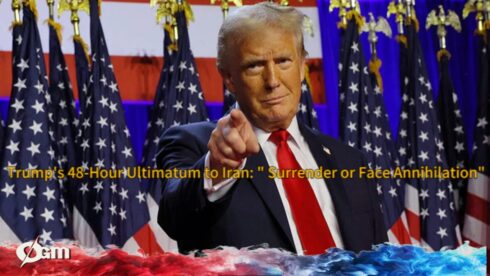Tensions between Iran and Israel escalated dangerously on Wednesday, with Iran issuing a stark warning that any U.S. military involvement in Israel’s ongoing strikes would trigger “all-out war.” The warning followed fresh Israeli airstrikes on Iranian soil, including hits on sensitive nuclear sites. President Trump, while maintaining the U.S. has not joined the conflict directly, has intensified rhetoric against Iran, raising fears of a broader regional war.
Israeli Airstrikes Hit Iranian Nuclear Sites
Israeli launched a major overnight operation, deploying over 50 fighter jets in a three-wave attack that targeted Iranian military and nuclear infrastructure. Brigadier General Effie Defrin of the Israel Defense Forces confirmed the strike hit a key centrifuge production site—part of Iran’s uranium enrichment capabilities.
The United Nations’ International Atomic Energy Agency (IAEA) reported that two facilities under its monitoring—the TESA Karaj workshop and the Tehran Research Center—were struck during the offensive. Both were previously part of the now-dormant Joint Comprehensive Plan of Action (JCPOA), which President Trump withdrew from during his first term.
Iran Retaliates Amid Soaring Civilian Death Toll
Iran’s Islamic Revolutionary Guard Corps retaliated with a volley of 25 missiles directed at Israeli cities, including Tel Aviv, Jerusalem, and parts of the occupied West Bank. Most were intercepted, but at least 24 Israeli civilians have been confirmed dead, including a 90-year-old woman killed in her apartment by a direct missile strike.
Iranian casualties have surged. While state authorities last updated the death toll at 220, the U.S.-based Human Rights Activists in Iran estimates at least 452 fatalities, including 224 civilians. The humanitarian toll has triggered a mass exodus from Tehran, as citizens flee the capital amid fears of further escalation.
Iran Issues Stark Warning Against U.S. Intervention
In a televised statement, Iranian foreign ministry spokesman Esmail Baghaei warned that any U.S. intervention would spark a full-scale regional war. “Any American intervention would be a recipe for an all-out war in the region with very, very bad consequences for the whole international community,” he stated.
Iran’s ambassador to the U.N. in Geneva, Ali Bahreini, echoed the warning, saying Iran would “respond strongly” not only to Israeli aggression but also to any direct U.S. involvement. Supreme Leader Ayatollah Ali Khamenei declared that military action by the United States would cause “irreparable damage,” calling President Trump’s threats “unacceptable.”
OGMNews.COM
Iran Warns of “All-Out War” as Trump Considers Joining Israeli Strikes on Nuclear Sites

On Tuesday, President Trump issued his harshest warning yet, demanding “unconditional surrender” from Iran’s leadership. Addressing Ayatollah Khamenei directly, the president said the U.S. “knew where he was,” adding ominously, “but we will not kill him—yet.” He also urged civilians in Tehran to evacuate immediately, fueling chaos on the city’s roads.
Despite insisting the U.S. has not joined the military campaign, five sources told CBS News that Trump is seriously considering expanding U.S. involvement, particularly targeting Iran’s heavily fortified Fordo nuclear enrichment facility. Such a strike would likely require U.S. capabilities, as Fordo is buried deep beneath a mountain.
U.S. Military Movements Signal Readiness for Escalation
While no direct U.S. strikes have been confirmed, signs point toward operational preparation. According to flight tracking data analyzed by BBC News, at least 30 U.S. military aircraft—primarily tanker planes used to refuel jets—were deployed from American bases to Europe in recent days.
Seven of those tankers reportedly stopped at key NATO staging grounds in Spain, Scotland, and England. Military analysts suggest this buildup indicates contingency planning for high-intensity operations in the Middle East. “These are not routine flights,” said RUSI analyst Justin Bronk. “They’re a prelude to something much bigger.”
Escalation Raises Global Security and Diplomatic Concerns
As hostilities intensify, international concern over a broader regional war has grown. The conflict is beginning to overshadow global diplomatic forums, with U.N. officials urging restraint and calling for immediate de-escalation.
Meanwhile, the U.S. Embassy in Israel has suspended operations through at least Saturday, underscoring the rapidly deteriorating security environment. Calls for an emergency U.N. Security Council meeting are mounting, but with the Trump administration considering further military action, prospects for diplomatic resolution remain uncertain.
Humanitarian Crisis Looms as Civilians Caught in Crossfire
With Tehran residents fleeing en masse and both Israeli and Iranian cities under threat, the risk of a humanitarian disaster is rising. Aid organizations are struggling to assess the situation, with restricted access and widespread destruction complicating response efforts.
“We are seeing the first signs of mass displacement, food shortages, and communications blackouts,” said a spokesperson for the International Committee of the Red Cross. “The longer this conflict goes on, the greater the human cost will be—not just for Iran and Israel, but for the entire region.”














